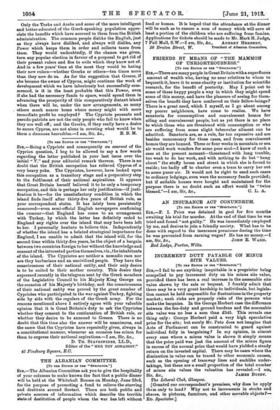[TO THE EDITOR ON THE " SPECTATOR. " ] SIB,—Being a Cypriote
and consequently an courant of the Cyprian question, I beg to be allowed to say a few words regarding the letter published in your last issue over the initial " V." and your editorial remark thereon. There is no doubt that the British occupation has relieved Cyprus of a very heavy yoke. The Cypriotes, however, have looked upon this occupation as a transitory stage and a preparatory step to the fulfilment of their national aspirations. It appears that Great Britain herself believed it to be only a temporary occupation, and this is perhaps her only justification—if justi- fication it be—for the unsatisfactory condition in which the island finds itself after thirty-five years of British rule, as your correspondent states. It has lately been persistently rumoured—even semi-official English newspapers confirming the rumour—that England has come to an arrangement with Turkey, by which the latter has definitely ceded to England any rights over the island that may have been left to her. I personally hesitate to believe this. Independently of whether the island has a belated strategical importance for England, I am unable to admit that the island will, for the second time within thirty-five years, be the object of a bargain between two countries foreign to her without the knowledge and consent of the interested parties themselves, viz., the inhabitants of the island. The Cypriotes are neither a nomadic race nor are they barbarians and an uncivilized people. They have the consciousness of their national entity, and their only desire is to be united to their mother country. This desire they expressed recently in the telegram sent by the Greek members of the Legislative Council to his Majesty King George on the occasion of his Majesty's birthday, and the consciousness of their national entity was proved by the great number of Cypriotes who participated in the war against Turkey, fighting side by side with the regulars of the Greek army. For the reasons mentioned above I entirely agree with your valuable opinion that it is Great Britain's duty to ask the Cypriotes whether they consent to the continuation of British rule, or whether they desire to be annexed to Greece. There is no doubt that this time also the answer will be unanimous, and the same that the Cypriotes have repeatedly given, always in a constitutional manner, whenever an occasion has arisen for them to express their national aspirations.—I am, Sir, &c., D. TH. STAVRINIDEB, LL.D., Editor of the " HMI TOT AONAINOT." 45 Finsbury Square, B.C.










































 Previous page
Previous page